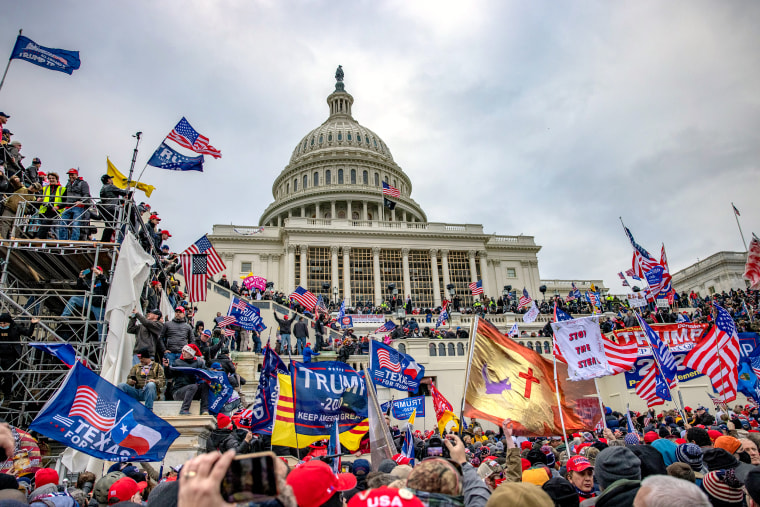Democrats and Republicans in Congress reached an agreement Friday on creating an independent bipartisan commission to investigate the Jan. 6 Capitol riot — but the House GOP leader said he didn't sign off on the deal moments after it was announced.
House Homeland Security Chairman Bennie Thompson, D-Miss., said in a news release that he had reached a deal with committee ranking member Rep. John Katko, R-N.Y., on creating a panel styled after the 9/11 Commission to study “the facts and circumstances of the January 6th attack on the Capitol as well as the influencing factors that may have provoked the attack on our democracy.”
The proposed 10-person commission will include five members, including a chair, appointed by House Speaker Nancy Pelosi, D-Calif., and Senate Majority Leader Chuck Schumer, D-N.Y., with the other five, including a vice chair, appointed by House Minority Leader Kevin McCarthy, R-Calif., and Senate Minority Leader Mitch McConnell, R-Ky., the release said.
But moments after Thompson's announcement, McCarthy said he had not approved the proposal, telling reporters that he wasn't even aware the press release was going to be sent Friday morning.
“That’s very concerning to me,” McCarthy said in response to being told that the commission would be limited in scope to the Jan. 6 riot.
"You've got to look at what the build-up before and what has gone on afterwards, otherwise the commission does not work," he said. He also accused Pelosi of having "played politics with this for a number of months."
McCarthy said Katko had told him the scope would be broader.
In a statement issued later Friday morning, Katko said the proposed commission would "investigate" the Jan. 6 attack and security vulnerabilities of the Capitol complex, but added that the "Capitol remains a target for extremists of all ideologies."
The legislation to create the commission, titled the National Commission to Investigate the January 6 Attack on the United States Capitol Complex Act (H.R. 3233), will be introduced by Thompson and Katko later Friday and is expected to be considered in the House as soon as next week.
The proposed bill mandates that commissioners have “significant expertise in the areas of law enforcement, civil rights, civil liberties, privacy, intelligence, and cybersecurity,” and current government officers or employees are prohibited from appointment.
The commission will have the authority to issue subpoenas to secure information to carry out its investigation, but that will require agreement between the chair and the vice chair or a vote by a majority of commission members, according to the bill.
Under the agreement, the commission will be required to issue a final report by the end of the year with findings on the facts and causes of the riot as well as recommendations to prevent future attacks on the country's democratic institutions.
“There has been a growing consensus that the January 6th attack is of a complexity and national significance that what we need is an independent commission to investigate," Thompson said in a statement. "I am pleased that after many months of intensive discussion, Ranking Member Katko and I were able to reach a bipartisan agreement.”
“Inaction — or just moving on — is simply not an option," Thompson added. "The creation of this commission is our way of taking responsibility for protecting the U.S. Capitol. "We owe it to the Capitol police and all who enter our citadel of democracy to investigate the attack.”
Pelosi, in her own statement, said it was "imperative that we seek the truth of what happened on January 6 with an independent, bipartisan 9/11-type Commission to examine and report upon the facts, causes and security relating to the terrorist mob attack."
The House speaker was supported in the effort by former House Republican Conference Chair Liz Cheney, of Wyoming, who was ousted from the No. 3 leadership position earlier this week for her rebuke of Republicans who have embraced former President Donald Trump's election falsehoods. Cheney, who voted to impeach Trump for his role in the events leading up to the Capitol riot, was succeeded Friday by Rep. Elise Stefanik, of New York, a staunch Trump defender.
“I think it’s great the speaker has announced the Jan. 6 commission, and I hope we’ll be able to really have the kind of investigation we need about what happened on Jan. 6,” Cheney told reporters on the Hill.
In a statement later Friday, Cheney called on "all members, especially House and Senate leaders," to support the legislation, adding "there should be no delay" in its passage.
"In the aftermath of national crises, such as Pearl Harbor, the Kennedy assassination, or September 11th, our nation has established commissions so the American people know the truth and we can prevent these events from happening again," she said. "The same thing is needed for January 6th and this commission is an important step forward to answering those fundamental questions."
The details of the proposed commission have been a thorny issue for months among Democratic and Republican leaders.
Pelosi’s original proposal for the commission would have given Democrats seven appointments, while Republicans would have had four. Democrats would have also had the power to issue subpoenas unilaterally.
The current agreement, however, more closely resembles a compromise Pelosi offered last month.
One outstanding issue had been the scope of the commission. Pelosi wanted the panel to focus only on Jan. 6 and the extremist groups that participated in the riot, but Republicans pressed to expand the scope to include political violence by the far-left.
The people who attacked the Capitol were supporters of former President Donald Trump and many were members of far-right groups and militias.
A majority of the public supports the creation of an independent commission to look into the attacks, according to recent polling.


